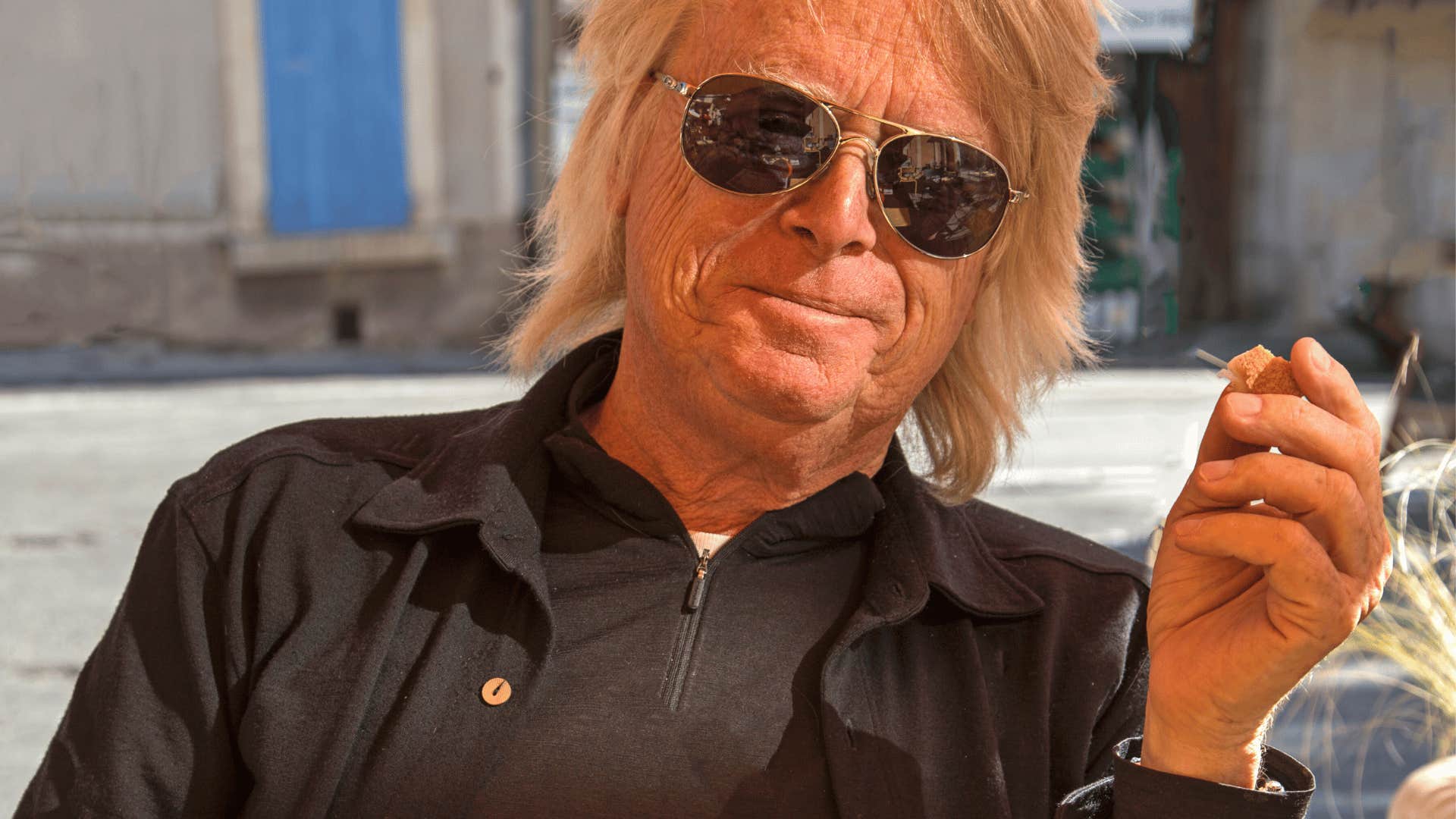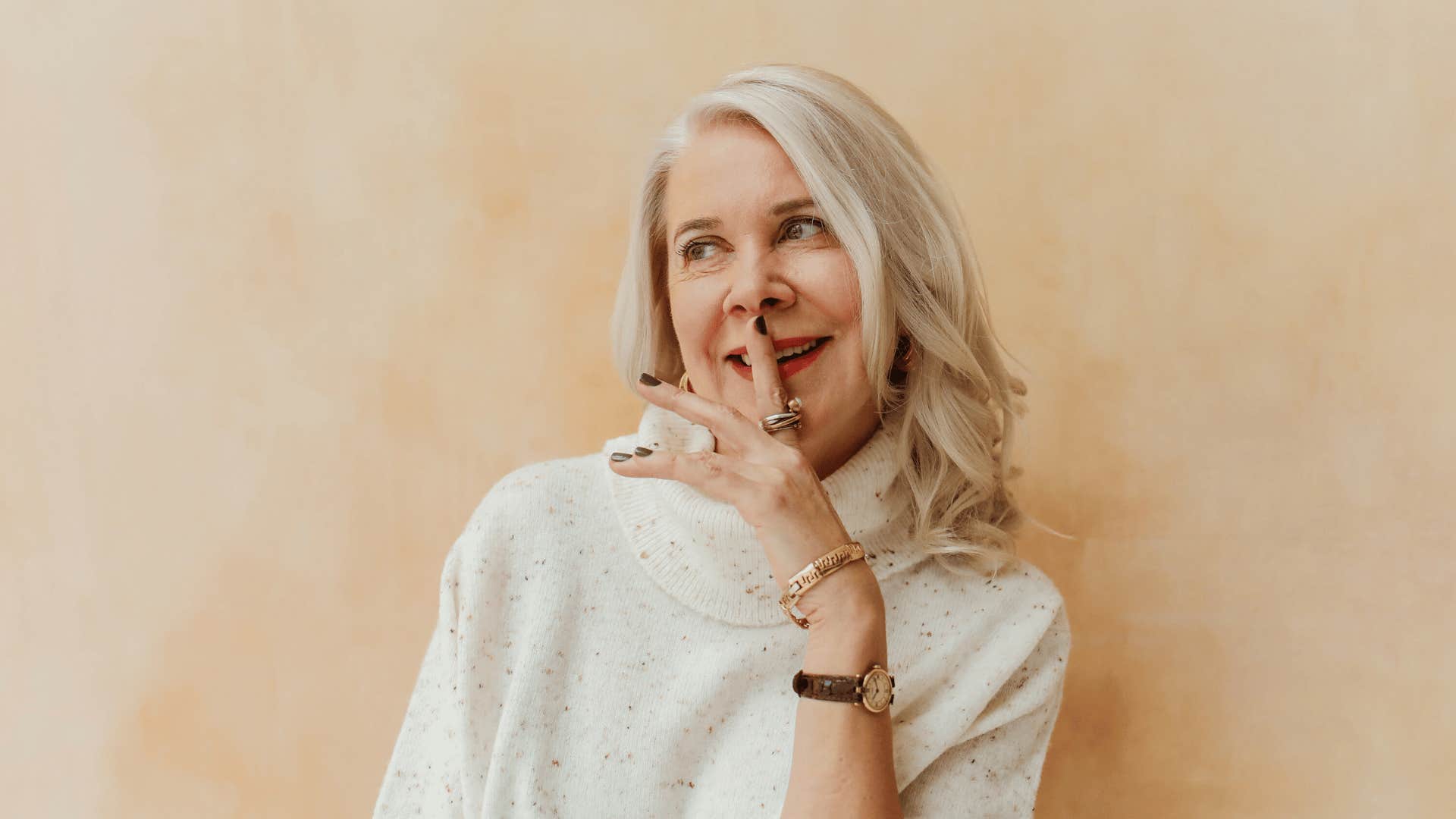11 Common Boomer Phrases That Are Woke Without Them Realizing It
What goes around comes around, and these phrases are way more modern than boomers may even realize.
 YAKOBCHUK VIACHESLAV / Shutterstock
YAKOBCHUK VIACHESLAV / Shutterstock With age comes wisdom, yet getting older can also make people more rigid and less open to change. As baby boomers enter their golden years, many think they seem to have lost sight of the messages that shaped them. Boomers who stood for peace, love, and understanding became people who complain about Gen Z's weak, fragile emotions. But despite their traditionalist stance, there are several common boomer phrases that are woke without them even realizing it.
It’s easy to look back on the past and declare how much better life was back then. Change can be scary, but it’s an unavoidable part of the human experience. By keeping a vice grip on the way things once were, boomers forget that the younger generations are in many ways doing exactly what they taught them to do with their words, even if not always with their actions.
Here are 11 common boomer phrases that are woke without them realizing it
1. ‘It is what it is’
 ChristiLaLiberte from Getty Images via Canva
ChristiLaLiberte from Getty Images via Canva
Boomers might not realize it, but the phrase “it is what it is” channels a consciousness that’s more woke than not. The phrase exemplifies a mindset of acceptance, taking a very Zen approach to navigating the chaos and uncertainty that the world holds.
Soto Zen priest Domyo Burk discussed some of the core aspects of Buddhist practice on “The Zen Studies Podcast.” They described one particular field of Buddism called “Zazen,” the act of seated meditation, which exemplifies the phrase “It is what it is.”
“When we sit, we aim to be wholeheartedly present with our life just as it is,” Burk said. “Only in the midst of this stillness and inner silence can we meet the world as it is unfolding around, within, and through us. As we pay close attention without agenda, Reality is illuminated.”
When boomers say “it is what it is,” they unknowingly embody an essential principle of Zen Buddhism, the idea of accepting life as is, without expectations.
2. ‘Treat people the way you want to be treated’
 nairi from diversifylens via Canva
nairi from diversifylens via Canva
The phrase “Treat people the way you want to be treated” is woke without boomers realizing it. The phrase captures the importance of centering compassion and kindness in every interaction. It can even be interpreted through a social justice lens, by considering the common humanity we all share.
The word “woke” gets thrown around the political arena without much thought put toward its historical and social context. As Elaine Richardson, a professor of literacy studies, explained, “In simple terms, it just means being politically conscious and aware, like stay woke.”
“It comes out of the experience of Black people of knowing that you have to be conscious of the politics of race, class, gender, systemic racism, ways that society is stratified and not equal,” she continued.
The golden rule is a classic for a reason. Treating others as you want to be treated is the baseline of human interaction. The word “woke” gets weaponized more often than not, yet its true purpose is to encourage people to stay open-minded and aware, recognizing that all people deserve respect.
3. ‘Live and let live’
 Tessa Chung from Capturenow via Canva
Tessa Chung from Capturenow via Canva
Boomers don’t realize that “Live and let live” is a woke phrase. It upholds tolerance and acceptance, which are fundamental facets of equity and inclusion. The phrase “live and let live” instructs people to withhold critical judgment and accept lifestyles that don’t perfectly match their own, because everyone has the right to a peaceful existence, as long as they’re not actively harming anyone else.
Psychologist Leon Seltzer shared his perspective on the phrase, declaring it “an idiom of humane mutuality” that’s easier said than done.
According to Seltzer, most people struggle to live and let live because of the deeply human need “to see ourselves as separate from, and better than, others— and so allow us to feel entitled to fulfill our desires independent and (at least relatively) neglectful of another’s wants and needs.”
All too often, self-interest and close-mindedness hold people back from fully embracing a “live and let live” mentality. Practicing acceptance isn’t easy, but it’s the only way to honor other people’s individuality.
4. ‘If you don’t have anything nice to say, don’t say anything at all’
 Polina Tankilevech from capturenow via Canva
Polina Tankilevech from capturenow via Canva
Tough love was a mainstay of the boomer parenting style, which meant they were often indifferent to their kids’ emotional struggles. Their phrase “If you don’t have anything nice to say, don’t say anything at all” is woke without them realizing it, as it extols the virtues of compassion, kindness, and respect.
Boomers aren’t known for holding their tongues, but this common phrase focuses on a kind of harm reduction in its belief that being cruel for cruelty’s sake is never actually worth it. Some people use the excuse “I’m just being honest” to justify the mean things they say, which overlooks how essential it is to tell the truth in a compassionate way.
“It takes guts to tell people the truth,” YourTango CEO Andrea Miller said on the “Getting Open” podcast. “It takes wisdom and guts to tell people the truth with care and compassion, because it’s not about one up-ism, it’s about saying, ‘I care enough.’”
“The easiest thing is just to let people say what they want to say and then judge them and then distance yourself from them,” she continued. “It feels like to really care is to put yourself in the ring.”
5. ‘Don’t judge a book by its cover’
 vadimgouida from Getty Images Pro via Canva
vadimgouida from Getty Images Pro via Canva
Boomers tend to criticize younger generations for being “too sensitive,” especially when they speak up about structural inequities. As much as boomers complain about “woke ideologies” making people soft, their common phrase “Don’t judge a book by its cover” is more woke than they realize.
In “Anti-Bias Education for Young Children and Ourselves,” authors Louise Derman-Sparks and Julie Olsen Edwards established that identity, diversity, justice, and activism are the core goals of anti-bias curriculum designed for young students.
They noted that the core goals “support children’s development of a confident sense of identity without needing to feel superior to others; an ease with human diversity; a sense of fairness and justice; the skills of empowerment; and the ability to stand up for themselves or for others.”
Boomers might not perceive themselves as particularly woke or politically aware at this point in their lives, but they taught their children that judging people based on outward appearance isn’t fair, which is a more inclusive mindset than they realize.
6. ‘Walk a mile in someone else’s shoes’
 nairi from diversifylens via Canva
nairi from diversifylens via Canva
For every complaint boomers have against “woke culture,” they laid the groundwork for inclusivity and empathic understanding with the common phrase “Walk a mile in someone else’s shoes.” Boomers might not believe that privilege and access impact people’s success, but this phrase acknowledges the importance of respecting differences.
Researcher and author Brené Brown pointed out that the idea of walking in someone else’s shoes only goes so far.
“We need to dispel the myth that empathy is ‘walking in someone else’s shoes,’” she explained. “Rather than walking in your shoes, I need to learn how to listen to the story you tell about what it’s like in your shoes and believe you even when it doesn’t match my experiences.”
According to Brown, true empathy comes from asking other people how they feel and “listening, being curious, affirming, and believing people when they tell us how they experienced something.”
“Like empathy, story stewardship is not walking in someone else’s shoes, it’s being curious and building narrative trust as they tell you about the experience of being in their own shoes,” Brown shared. “It’s about believing people when they tell you what an experience meant to them.”
7. ‘It takes a village to raise a child’
 Monkey Business Images via Canva
Monkey Business Images via Canva
Boomers tend to have an individualistic mindset, yet their phrase “It takes a village to raise a child” upholds the very woke concept that caregiving is a communal act. The phrase comes from an African proverb and “conveys the message that it takes many people to provide a safe, healthy environment for children, where children are given the security they need to develop and flourish, and to be able to realize their hopes and dreams.”
The phrase centers around the idea of collective responsibility, emphasizing how valuable it is for both children and parents to have help from people outside the family structure, including extended family members, teachers, neighbors, and other pillars of community support.
If children truly are the future, then we all should be deeply committed to the well-being of younger generations.
8. ‘Money can’t buy happiness’
 ChristiLaLiberte from Getty Images via Canva
ChristiLaLiberte from Getty Images via Canva
In many ways, boomers exemplify the truth behind the woke phrase “Money can’t buy happiness.” While they’re wealthier than every generation following behind them, boomers are living proof that money can provide access and stability, but it doesn’t make people feel fulfilled.
As certified life coach Kelly Rudolph revealed, “There's more to happiness than just experiences and fleeting moments.” True happiness “starts with developing regular habits that increase your mental health and emotional state each day.”
Spending money might give you a temporary boost, but long-lasting happiness has less to do with what you own and way more to do with the relationships you cultivate and your outlook on the world.
9. ‘Think before you speak’
 ChristiLaLiberte from Getty Images via Canva
ChristiLaLiberte from Getty Images via Canva
Boomers don’t realize just how woke their common phrase “Think before you speak” is. This phrase upholds the idea that communication is based on basic human decency and mutual respect. It also encourages mindfulness and putting empathy into action.
Social worker Lyssa deHart described empathy as “the ability to feel compassion for others in relation to their own experiences. It’s finding a way to recognize ‘me’ in ‘you.’”
“Empathy is grounded in listening,” she shared. “You need to be willing to suspend your own voice, perspective, or opinion long enough to really listen to the other person.”
A lack of empathy keeps people at a distance from each other, making it hard for them to locate compassion for anyone else. Without empathy, “You build walls against the annoyances, the hurt, and disappointments and begin to see yourself as different than others,” deHart explained.
Empathy is the foundation upon which our most successful relationships are built, because “your ability to care allows you access to the other person’s emotional landscape,” which ultimately bridges the divide and brings you closer.
10. ‘Two wrongs don’t make a right’
 Goran13 from Getty Images via Canva
Goran13 from Getty Images via Canva
Boomers might not be the most justice-oriented people, but their phrase “Two wrongs don’t make a right” is more woke than they realize. This common phrase encourages people to take careful consideration of how their behavior impacts others. It’s a nod toward holding oneself accountable, in that it asks people not to jump into vengeful action, but rather, to take the high road.
Just because someone wronged you doesn't mean you should act in kind. Revenge might feel good momentarily, but ultimately, it only perpetuates cruelty and harm.
11. ‘What goes around, comes around’
 ChristiLaLiberte from Getty Images via Canva
ChristiLaLiberte from Getty Images via Canva
The common phrase “what goes around, comes around” is more woke than boomers realize. It captures the Western interpretation of karma, maintaining that “good deeds will be rewarded with good results, with the opposite for bad deeds.”
The concept of karmic retribution might seem far out for a lot of boomers, but the idea that what goes around, comes around, is rooted more in reciprocity than any cosmic belief system. Reciprocity is based on human decency. It upholds the belief that you should treat people well if you want to be treated well. When you’re offered respect, returning that respect is the best way forward.
Alexandra Blogier, MFA, is a staff writer who covers psychology, social issues, relationships, self-help topics, and human interest stories.
